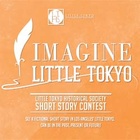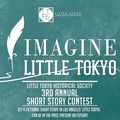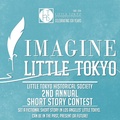Little Tokyo, 1941
As I walked toward Little Tokyo over the First Street Bridge from Boyle Heights, I felt the bracing power of the fiery sunset embrace me with more love than my own family gave me. The sky and the air filled me with hope, filled me with big dreams. My father only filled me with anger.
One day as I was leaving my job, I heard loud taiko drums and bamboo flutes wailing away outside a temple on First and Central. A group of dancers were dancing in a big circle when she suddenly appeared. She was wearing a beautiful white silk kimono and moved and danced as free as the wind. And her face…it radiated…like a Madonna.
She glanced at me as she floated by and it stopped me cold in my tracks as the beast in my heart started to dance along with the drums. There were many Japanese American girls at Roosevelt High School, but nobody quite like her. I couldn’t get her out of my mind all summer long.
When school finally started up, I saw her in the hallway and worked up enough courage to talk to her. To talk to a saint was tougher than my last fight. I was training for the Golden Gloves flyweight crown. I was a good fighter. And even though I only had two wins and five losses, I knew I’d be a champion someday even though my father didn’t think so.
“Hi. I saw you dance in Little Tokyo during the s-s-summer,” I stammered.
“Hi. Yes, I remember you. That was part of the obon festival at my temple, Nishi Hongwanji. Every July we honor the memory of our ancestors and that dance was my way of honoring mine.”
“Oh, man! You know what? Mexicans honor our ancestors too, on Día de los Muertos, Day of the Dead. Hijole, we have something in common!”
She just stared at me with a soft smile. “¡Bueno, que bien! I’m sure our ancestors are grateful that we don’t forget them. Remembering them keeps us humble…and human, que no? And, after all, we’ll be ancestors too someday.”
“Simón, yeah, right, I never thought of that.”
“How did you learn Spanish?”
“Oh, my Boyle Heights neighbor, Doña Casillas. We help each other take care of our gardens.”
“Orale, that’s nice. What’s your name?” I bravely asked.
“Yuriko Nakamura. What’s yours?”
“I’m Carlos Gutiérrez. I’m a boxer,” I proudly proclaimed. “I always walk through Little Tokyo after my work out at the Main Street gym, and, after work. That’s when I saw you dance.”
“Oh, I see. I work on First after school, at my parent’s place, the Ebisu Restaurant.”
“Oh, yeah? Guess what? I work a couple doors down from you at Kimura Brothers Dry Goods.”
“Oh, well, you’ll have to stop by the restaurant sometime.”
“Orale, I will. Thanks!” Man, I felt good. Felt like a champion.
Walking through Little Tokyo—or J-Town as it’s also known—is like walking through a town in Japan without ever leaving L.A. Little shops selling mochi ice cream, grocery stores selling all kinds of fish along with fresh produce in outdoor sidewalk bins, hardware stores, pool halls, hotels, Japanese and Chinese restaurants, and they even have their own newspaper, The Rafu Shimpo. The people are friendly and nice to me even though they don’t know me. I like that. They even bow to you when they meet you. They make you feel like you’re somebody. In Boyle Heights I’m just another Mexican kid on the street trying to survive.
I was nervous sitting at the counter. I’d never been in a Japanese restaurant before.
“Hola Carlos, que tal? Good to see you. What will you have?”
“Hola, Yuriko, good to see you too. I’ll have Chow Mein, por favor,” I said confidently.
“We serve Japanese food, not Chinese.”
“Oh. Sorry. Something with hot sauce, please.” Her mother looked over and smiled. “I just left the gym and was hungry so I thought I’d drop by.”
“Glad you did. So, you want to be a boxer?” she asked as she handed me a bowl of miso soup, a bowl of rice, sushi, and what looked like a scoop of avocado.
“Yeah, I want to show my father that I can be somebody great, you know—a champion. But you, hijole, you’re already great, a great dancer! I’ve never seen dancing like that before.”
“Oh, thanks. I started as a little girl. It’s my duty to keep our cultural traditions alive. But unfortunately, it leaves little time for fun. Besides, my parents are very strict.”
“Yeah, I know what you mean. Between school, work, and training there’s no time for fun. Funny how we’re alike like that.” She just stared at me without saying a word. It was a serious stare with a sweet smile in it and it drove me crazy as my head blew off my shoulders. The green stuff was not avocado. It was wasabi, blazing hot horseradish.
Then, with those intense, gentle eyes she softly asked, “Do you believe in destiny, Carlos?”
“I don’t know what that means.”
“It means that whatever happens in life is meant to happen. There are no accidents. There are no coincidences. Life is just…alive.”
“What are you talking about?” I said as I wiped the tears from my eyes.
“Oh, that’s some of my Buddhist beliefs and some of my own.”
“¿Boo… que? I never heard of that word.”
“Well, Buddhism teaches that the present moment is all that matters. Treat it and yourself with careful attention and respect with what you do and say and the future will be—swell.” Mrs. Nakamura handed me another glass of water and more napkins.
“Uh, that’s very interesting. Gracias, Mrs. Nakamura that was delicious. When are you going to dance again?”
“I’ll be in a dance recital at our temple next month. If you’re interested come on by.”
“Orale, awright! Thanks! Stop by the gym sometime. It’s on Main by First.”
“Okay, I’ll try.”
“Ay te watcho, Yuriko.”
A long week went by. Then, there she was. I couldn’t believe it. I started to spar a little harder with my partner. I guess I was showing off. He came back with a fast left and a right upper cut that messed me up pretty good. It made me angry so I tore into him. My trainer stopped the workout and said, “Carlos. You’re problem is that you get mad. You can’t box when you’re mad. You box. Period. A champion knows the difference.” She heard it all.
“That was hard to watch.”
“Well, it gets my anger out. My father thinks I’m a loser. Truth is he’s the loser. He was close to being a champ but the bottle got in the way. It killed my poor mom with a broken heart watching him drink his life away like that.”
She looked deep into my eyes and said, “There’s a saying in bushido, ‘a samurai warrior does not fight his opponent, he watches and reacts with respectful honor.’ My father is a bushido teacher at Rafu Dojo on San Pedro Street. You should go.” I did, and a new world opened up for me.
Mr. Nakamura was a martial arts master in judo and kendo. He taught me to only eat fish, fowl, rice, and vegetables. I learned to meditate, to quiet my angry emotions and thoughts. I learned about the Buddhist Eight Fold Path which taught me about wisdom: know what your essence is; ethics: watch what you do or say, don’t waste your life; and mental discipline: to make and keep commitments—things I never knew about. One of the main teachings was that in bushido, “If you hesitate, it’s too late.”
After a few months my mind and body felt stronger. My boxing was smoother with a constant flow of calm energy and I was more focused on the movements of my opponents. I didn’t get angry when they started to attack and score points. I just refocused and right when they’d start to throw another series of punches, I’d step in without hesitation and punch away. It became a winning habit.
Mr. Nakamura was so impressed with my commitment and dedication in kendo that he gave me a katana sword which was a great honor. He named it “focus” in Japanese. But even though I was making great progress as his student, he still wouldn’t let me date Yuriko.
Then one of the greatest moments of my life happened. Yuriko came to one of my winning bouts and afterwards said, “Carlos, you are boxing like a champion, like a samurai, even my father said so. I’m so proud of you.” With that, I lost my mind and threw my arms around her and finally kissed her. It felt like the world was in slow motion, painless, like when you get knocked out.
“Carlos!”
“Sorry Yuriko. Perdón, I couldn’t help it.”
“Oh no, don’t be sorry. It was beautiful,” she said as she took my hand and smiled.
All was going great. I was a contender for the crown, was dating Yuriko, and I had her parents respect to boot. My father still wouldn’t give me any. But I didn’t need it from him anymore.
After a long workout, I headed to the Ebisu to see my girl. It was an unusually warm and sunny day in December, and I was feeling like a champ. Then, while I was enjoying some of Mrs. Nakamura’s miso soup, the radio blared out, “Japan has attacked Pearl Harbor!” Everyone in the restaurant froze in dead silence. It felt like the world had come to an end. I grabbed Yuriko’s hand and squeezed it tight. We just stared into each others’ eyes. We couldn’t talk. Nobody could. It was a very sad Christmas that year.
In February, the following year, President Roosevelt signed Executive Order 9066 that said all Japanese Americans were to evacuate their homes and property and were to go to what they called, “internment camps,” but were actually prisons. Doña Casillas graciously offered to store most of Yuriko’s things with her. Yuriko wasn’t able to attend her, nor my graduation, nor my championship fight, which I lost. And, finally, my father passed away from drinking. I was alone for the first time in my life facing the biggest challenge of my life—being apart from Yuriko.
I moved into a room at the Empire Hotel on First. Glenn Miller’s romantic Moonlight Serenade, Yuriko’s favorite, was playing on the radio as I wrote her this letter. She taught me how to write Japanese haiku poetry before she left.
Mi Querida, Yuriko:
This poem is about the last time I saw you at your temple as you and your parents got on the bus with all the others. I hope you like it.
“Goodbye”
The sun couldn’t shine
Air choking with emotion
Destiny breathing
Five busses pulled up
Lined up ready to fill up
Straight to ManzanarNeeded a strong heart
Strong as a samurai sword
Fierce as a YaquiMelted when you smiled
Arms wrapped in desperation
Our tears fell in grace
“This ain’t right,” I said
Relatives in Tijuana
Let’s get out of here!”“Can’t leave family
Can’t leave my duty behind
It’s my cross to bear”You got on the bus
Sat in deep mediation
Honor, crown of thornsBusses pulled away
Almost refusing to go
As the stunned crowd wavedWinds started to moan
Dark clouds spun a sad rainbow
Angels sang the bluesSayonara, babe
Adios Yuriko
Cuidate bien, mi reinaTe amo,
Carlos
She wrote back.
Mi Querido, Carlos:
Thanks for the beautiful haiku. You have become a great poet! Here is my reply also an informal haiku.
“Manzanar”
Camp is heartbreaking
But this is our destiny
Make the most of itGuards in gun towers
Watching us like criminals
Wrapped in cold barbed wireThe skies are ice blue
Jagged peaks covered in snow
Desert dust storms chokeCold nights this winter
Bitter wind blows through wall cracks
Our love keeps me warmObon this summer
Keeping traditions alive
Ancestors will danceOur love will endure
Meditation keeps me calm
Your love is my strengthI miss my garden
I miss Little Tokyo
I miss you, sweetheartTe amo,
Yuriko
The separation drove me crazy. I lost my job when Kimura Brothers had to close. I stopped boxing. I stopped meditating. I felt weak and empty. So, I decided to join the Marines. Most of my friends were signing up. It was “the American thing to do” even though I was mad at the Marines and sailors for attacking my pachuco buddies in the Zoot Suit riots. But still, it felt strange to be fighting Yuriko’s people. But, it was because of them that she was in a concentration camp.
I was sent to Iwo Jima and fought in one of the last battles that eventually ended the war. Our company was attacked one early morning killing most of my platoon. We held our ground until our ammo ran out. Then my commander yelled, “fix bayonets!” As I faced the oncoming troops, I remembered what Mr. Nakamura taught me about kendo sword fighting, “If you hesitate, it’s too late.”
I bowed to the enemy as they attacked. Then, my mind left my body as I swung and thrust my razor sharp bayonet with blazing speed killing five soldiers before being shot several times and left for dead. I prayed by saying Yuriko’s name over and over until the Medics found me before I bled to death. My platoon, what was left of it, barely survived the attack. It was the toughest bout of my life and instead of winning the flyweight crown I received the Medal of Honor. My parents would’ve been proud.
When I finally saw Yuriko get off the train at Union Station I ran to her, limping and crying like an orphan with polio seeing his parents for the first time. She was thinner but still had that serene radiant smile. That’s what I was living and almost died for.
We eventually got married at Nishi Hongwanji. I wore a fancy tailor made black and silver mariachi suit and Yuriko wore her mother’s treasured white silk wedding kimono. She looked so gorgeous she glowed—like the first time I saw her—an immaculate vision of love.
I opened up a school that combined boxing and martial arts and Yuriko became a traditional dance teacher at Nishi Hongwanji. She was also in charge of organizing the summer obon festivals along with the help of our beautiful kids, Ichiko, Emiko, and Carlitos.
Yuriko, Mr. and Mrs. Nakamura, and Little Tokyo, had turned this angry Chicano into a poet, a war hero, a teacher, a husband, a father, and finally, into a true champion—a man.
*This article is the second place winner of Little Tokyo Historical Society’s Imagine Little Tokyo Short Story Contest. It was originally published in The Rafu Shimpo on June 24, 2014 and the LTHS website in July 2014.
© 2014 Rubén “Funkahuatl” Guevara





